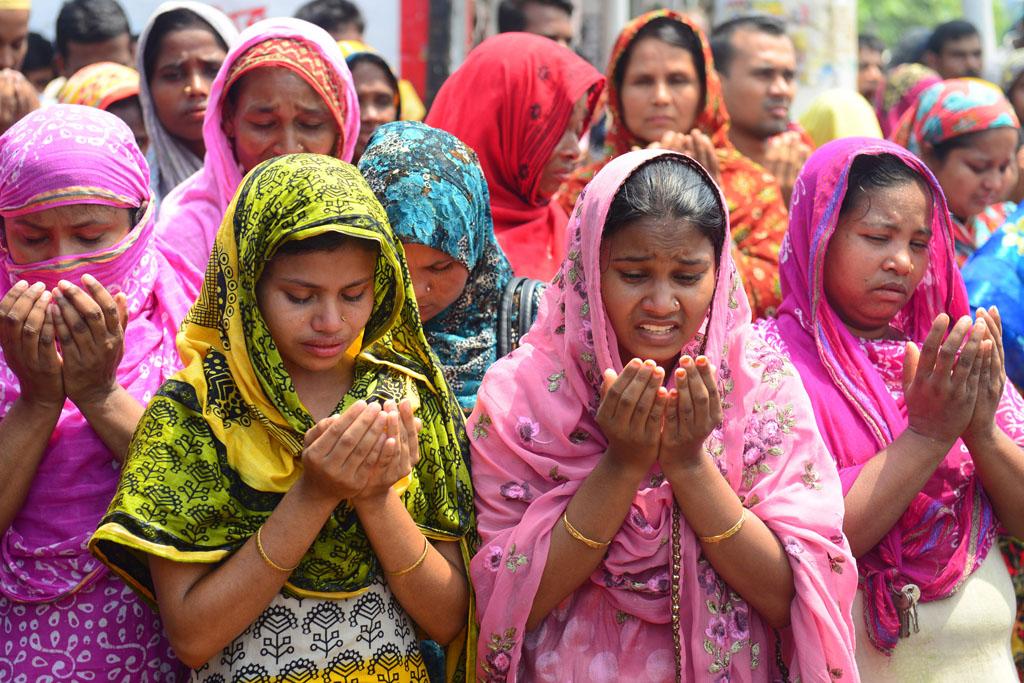Fashion retailers H&M and Zara will sign Bangladesh safety accord
Bangladeshi family members of missing garment workers offer prayers in front of the rubble of a nine-storey building collapse in Savar, on the outskirts of Dhaka on May 14, 2013. Bangladesh’s army wrapped up its search May 14, 2013 for bodies in a collapsed nine-storey building outside the capital as dozens of people were still massed at the site for news of their missing relatives.
BRUSSELS — Major European fashion retailers H&M and Zara have agreed to sign a legally binding safety accord aimed at improving work conditions in Bangladesh clothing factories, after an April building collapse killed at least 1,127 people in Dhaka.
Titled the Accord on Fire and Building Safety in Bangladesh, it was drafted by the International Labor Organization and other labor groups. Spain-based Zara and Swedish H&M have joined British Tesco and Primark in signing on to the accord, the BBC noted, along with other clothing companies — with the notable absence of major US retailers.
More from GlobalPost: Woman found alive 17 days after factory collapse
What would such an accord accomplish? Independent safety inspections with public reports, and mandatory renovations and fixes will be on the docket, wrote USA Today, while both brands and retailers will be required to cut off any factory that fails to comply with the new rules.
The terrifying scale of the Bangladesh clothing factory disaster has galvanized world opinion and pushed major fashion brands into changing their approach to the cheap production offered by the impoverished Asian nation.
For 12 years, the Workers Rights Consortium (WRC), a US-based independent labor monitoring organization, has been monitoring working conditions in the factories around the world that produce major clothing brands and campaigning for improvements. The WRC and other campaign groups have welcomed the decision by H&M, Zara owner Inditex and other leading European retail groups to sign up to the Fire and Building Safety Plan for Bangladesh.
Workers and unions will also be allowed more say in the safety process. The deadline for more retailers to sign on is set at May 15th.
Wal-Mart, Sears, and J.C. Penney didn't sign on to the accord, the Wall Street Journal noted, adding that manufacturers based in the US appear to be working on their own safety accord for Bangladesh instead.
Gap, an American clothing retailer, said that its only objection to the accord related to how disputes are solved in courts. "The litigation landscape is different in the US than in Europe," Bill Chandler, Gap's vice president of global corporate affairs, told The Journal.
Facing an online petition, GAP announced that it plans to sign up if it resolves legal issues with the safety plan.
"We hope for a broad coalition of signatures in order for the agreement to work effectively on ground," said H&M head of sustainability Helena Helmersson in a statement, according to Reuters.
Bangladesh is the second largest clothing manufacturer on the planet, trailing only China — but workers suffer from loose labor and safety regulations, an ill the new agreement hopes to address.
The WRC estimates the costs of bringing Bangladeshi factories up to Western standards at a maximum of $3 billion, or less than 3 percent of the $95 billion expected to spent on garment manufacturing over the next five years. In a statement released after the Rana Plaza building collapse, the WRC said 10 cents per tee-shirt would be enough for the industry to cover those costs.
“This agreement is exactly what is needed to finally bring an end to the epidemic of fire and building disasters that have taken so many lives in the garment industry in Bangladesh,” said WRC's Executive Director Scott Nova, according to the Associated Press. “It is a legally binding, enforceable agreement under which signatory companies must take the steps necessary to protect the lives of the workers who make their clothes.”
More from GlobalPost: Bangladesh rescue efforts end as Dhaka announces wage hike plans
Senior correspondent, Paul Ames, reported from Brussels, Belgium.
Every day, reporters and producers at The World are hard at work bringing you human-centered news from across the globe. But we can’t do it without you. We need your support to ensure we can continue this work for another year.
Make a gift today, and you’ll help us unlock a matching gift of $67,000!
